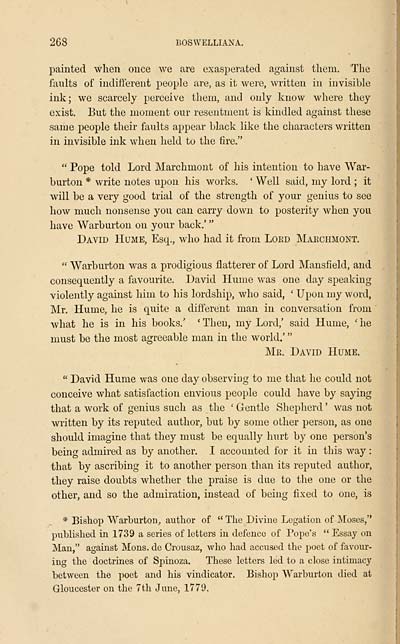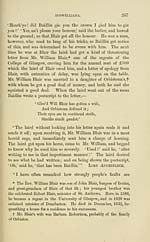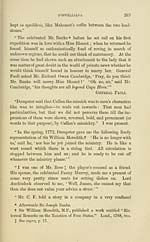Grampian Club > Boswelliana
(302) Page 268
Download files
Complete book:
Individual page:
Thumbnail gallery: Grid view | List view

268 BOSWELLIANA.
painted when once we are exasperated against them. The
faults of indifferent people are, as it were, written in invisible
ink; we scarcely perceive them, and only know where they
exist. But the moment our resentment is kindled against these
same people their faults appear black like the characters written
in invisible ink when held to the fire."
" Pope told Lord Marchmont of his intention to have War-
burton * write notes upon his works. ' Well said, my lord ; it
wiU be a very good trial of the strength of your genius to see
how much nonsense you can carry down to posterity when you
have Warburton on your back.' "
David Hume, Esq., who had it from Loed Marchmont.
" Warburton was a prodigious flatterer of Lord Mansfield, and
consequently a favourite. David Hume was one day speaking
violently against him to his lordship, who said, ' Upon my word,
Mr. Hume, he is quite a different man in conversation from
what he is in his books.' ' Then, my Lord,' said Hume, ' he
must be the most agreeable man in the world.' "
Mr. David Hume.
" David Hume was one day observing to me that he could not
conceive what satisfaction envious people coidd have by saying
that a work of genius such as the ' Gentle Shepherd ' was not
written by its reputed author, but by some other person, as one
should imagine that they must be equally hurt by one person's
being admired as by another. I accounted for it in this way :
that by ascribing it to another person than its reputed author,
they raise doubts whether the praise is due to the one or the
other, and so the admiration, instead of being fixed to one, is
* Bishop Warburton, author of " The Divine Legation of Moses,"
published in 1739 a series of letters iu defence of Pope's " Essay on
Man," against Mons. de Crousaz, who had accused the poet of favour-
ing the doctrines of Spinoza. These letters led to a close intimacy
between the poet and his vindicator. Bishop Warburton died at
Gloucester on the 7th June, 1779.
painted when once we are exasperated against them. The
faults of indifferent people are, as it were, written in invisible
ink; we scarcely perceive them, and only know where they
exist. But the moment our resentment is kindled against these
same people their faults appear black like the characters written
in invisible ink when held to the fire."
" Pope told Lord Marchmont of his intention to have War-
burton * write notes upon his works. ' Well said, my lord ; it
wiU be a very good trial of the strength of your genius to see
how much nonsense you can carry down to posterity when you
have Warburton on your back.' "
David Hume, Esq., who had it from Loed Marchmont.
" Warburton was a prodigious flatterer of Lord Mansfield, and
consequently a favourite. David Hume was one day speaking
violently against him to his lordship, who said, ' Upon my word,
Mr. Hume, he is quite a different man in conversation from
what he is in his books.' ' Then, my Lord,' said Hume, ' he
must be the most agreeable man in the world.' "
Mr. David Hume.
" David Hume was one day observing to me that he could not
conceive what satisfaction envious people coidd have by saying
that a work of genius such as the ' Gentle Shepherd ' was not
written by its reputed author, but by some other person, as one
should imagine that they must be equally hurt by one person's
being admired as by another. I accounted for it in this way :
that by ascribing it to another person than its reputed author,
they raise doubts whether the praise is due to the one or the
other, and so the admiration, instead of being fixed to one, is
* Bishop Warburton, author of " The Divine Legation of Moses,"
published in 1739 a series of letters iu defence of Pope's " Essay on
Man," against Mons. de Crousaz, who had accused the poet of favour-
ing the doctrines of Spinoza. These letters led to a close intimacy
between the poet and his vindicator. Bishop Warburton died at
Gloucester on the 7th June, 1779.
Set display mode to: Large image | Transcription
Images and transcriptions on this page, including medium image downloads, may be used under the Creative Commons Attribution 4.0 International Licence unless otherwise stated. ![]()
| Publications by Scottish clubs > Grampian Club > Boswelliana > (302) Page 268 |
|---|
| Permanent URL | https://digital.nls.uk/82555028 |
|---|
| Description | Note: Numbers 24-41 are relative to but not part of the Club's series. |
|---|---|

